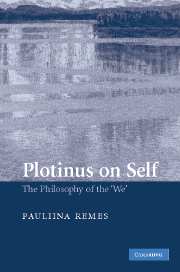Book contents
- Frontmatter
- Contents
- Acknowledgements
- Note on editions and abbreviations
- Introduction
- PART I THE ENDOWED STRUCTURES OF SELFHOOD
- PART II CONSTRUCTING THE SELF: BETWEEN THE WORLD AND THE IDEAL
- 4 Sculpting your self: self-determination, self-control and self-constitution
- 5 Action and other people: the self as a citizen of two communities
- 6 Losing the limits of the self?
- Conclusion
- Bibliography
- Index locorum
- General index
6 - Losing the limits of the self?
Published online by Cambridge University Press: 26 October 2009
- Frontmatter
- Contents
- Acknowledgements
- Note on editions and abbreviations
- Introduction
- PART I THE ENDOWED STRUCTURES OF SELFHOOD
- PART II CONSTRUCTING THE SELF: BETWEEN THE WORLD AND THE IDEAL
- 4 Sculpting your self: self-determination, self-control and self-constitution
- 5 Action and other people: the self as a citizen of two communities
- 6 Losing the limits of the self?
- Conclusion
- Bibliography
- Index locorum
- General index
Summary
In his study on those aspects which people usually connect with the notion of self, Galen Strawson lists two items that serve as a starting point for this chapter. Often, a common, non-theoretical understanding and usage of ‘self’ includes a non-explicit assumption that the self is a definite being in two senses. Firstly, that it is single, and not, for example, a group. It is a single thing in the same way that a block of marble is a single thing. And secondly, that it is a thing with a typical causal profile of things: something that can undergo and do things. Since Hume's claim that we can never experience any self separate from experiences, any suppositions about a self as a single entity-like thing have come into question: nevertheless, the above features appear to be persistent features of thinking about our own nature. We have an experience of ourselves as at least to some extent unified beings with persistence in time, and with a role to play in the causal processes of the universe. A question remains, however, as to what extent the kind of terminology we use to talk about ordinary things and their singleness, such as ‘entity’, ‘limit’, ‘definiteness’, etc., can be applied to selves. Since Plotinus distinguishes a notion of self from that of soul, and since, as we have seen, he operates with a flexible idea of selfhood that incorporates several aspects, it remains to be seen where he stands in relation to the self's nature, i.e., whether he assumes that the self is a single thing with limits and causal profile very much like that of material things, or whether it is something altogether different, and if the latter, how it differs from other entities in the universe.
- Type
- Chapter
- Information
- Plotinus on SelfThe Philosophy of the 'We', pp. 239 - 253Publisher: Cambridge University PressPrint publication year: 2007



